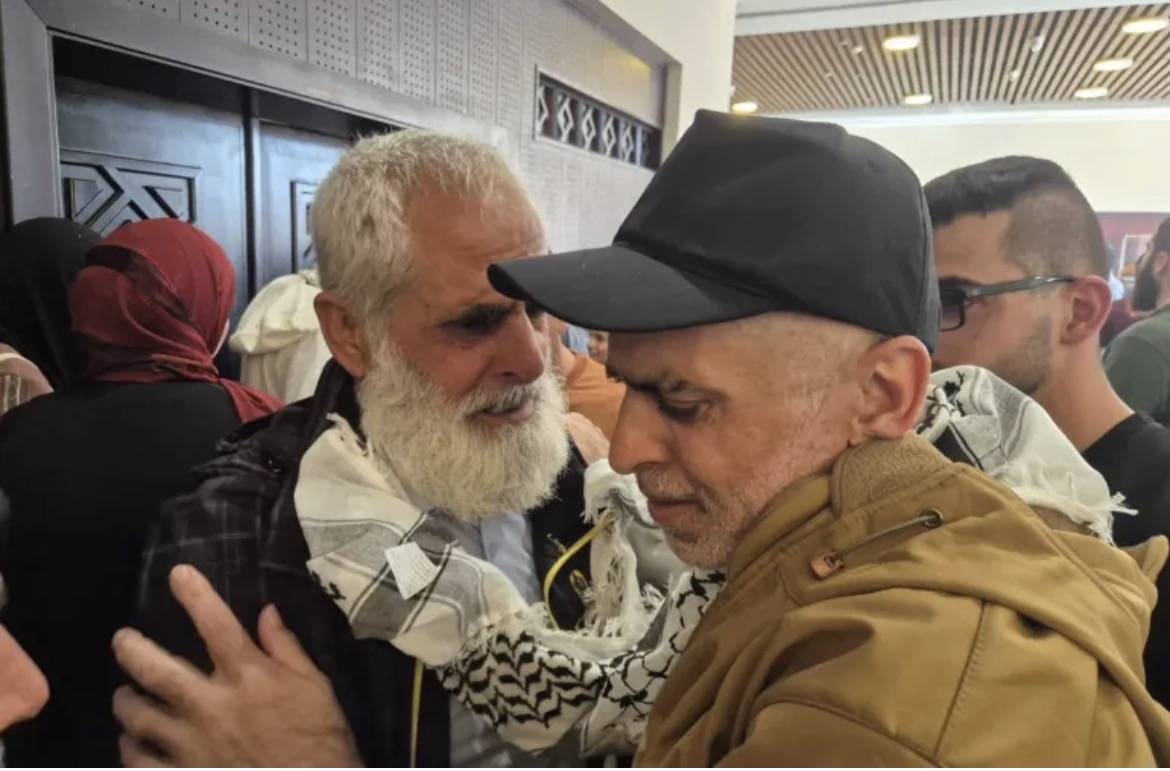The stories of two Palestinian prisoners: one who was able to go home, and another who was exiled by Israel.
It was a dawn like many others in Ramallah, full of hopeful whispers and anxious waiting. For some families, days turned into years behind prison walls; for others, the harshness of exile was their sentence even after release. In the prisoner swap deal brokered recently, two very different stories emerged: one of a brother, freed at long last, who walked back into the embrace of home; the other of a man released — but not to his homeland, condemned instead to exile.
The one who came home
Bassam al-Zeir’s hands shook as he stood in the Ramallah Cultural Centre, gathering himself to see his brother Hani after more than two decades. Arrested in 2002, Hani had spent 23 years in Israeli custody, sentenced to 25 years. Cousin Arafat, caught in the same sweep, served 35 years.
That morning, when the bus carrying Hani pulled in, Bassam pushed through the crowd, straining his eyes to see him. Time had dimmed many things — the freshness of youth, perhaps, the sharpness of memory — but not the relief. When the brothers embraced, tears bore witness to years of longing, absence, and pain. For Bassam, the moment was indescribable: “I felt my breath return, as if life had returned.”
For Hani, home was more than a place. It was a family, fading photographs, the voice of children he had grown not hearing his footsteps. His release was a triumph of persistence, a fulfillment of prayers deferred. The prison’s walls, the chains, the long nights — they were real, but in that embrace, he reclaimed something beyond the condition of his body: memory, identity, belonging.
The one who was exiled
In contrast, there was Muhammad Ahmad Imran from Hebron. Arrested in December 2022, given 13 life sentences, his family had been told in recent days that he would be released and return to the West Bank. They packed, they traveled, anticipating the joy of reunion. But that morning, at the Cultural Centre, they learned something more painful: Imran would not be coming home. Instead, Israel had decided that he would be exiled — forced to leave Palestine, sent to a third country with uncertain borders, no legal right of return, no guarantee that his family could ever see him again.
There was no physical barrier to cross, but for his family, a deep and crushing separation took its place. The exile order is not merely a relocation. It is displacement, erasure of ties, and a severing of what it means to belong. Raed Imran, Muhammad’s brother, was stunned. “All words fail,” he said. “Maybe we’ll get to see him somehow. What matters is that he is released, here or abroad.” But the grief is layered: the relief that life is spared, the sorrow that freedom comes with punishment, that release can also be loss.
Between joy and injustice
These two stories live side by side in the same exchange. One brother walks out of prison through the familiar gate; another steps out into an unfamiliar land. One is met with embrace, cheers, the names uttered, the face recognized. The other, with borders, transit, distance, the constant ache of absence.
Legal scholars and human rights groups have called the forced exile illegal under international law, arguing that citizens cannot be stripped of their right to return simply as part of a deal. Observers point out the cruelty of releasing someone from prison only to send them away from home, family, community — to places where their movement and political life are severely constrained.
Families of exiled prisoners face immense obstacles: travel restrictions, bureaucratic walls, and a deeper question of identity. Even when access is possible, getting visas, shelter, permission to reunite are fraught. It’s a freedom shadowed by distance and silence.
More than one story
These contrastive experiences remind us that “release” can carry many meanings. For some, it is the return — to home, to family, to community. For others, it is departure, exile, perhaps even exile in exile: free in body, tied by displacement, longing, rule-by-others.
The prisoner exchange embodies both hope and heartbreak. It restores some measure of justice, yet imposes new injustices. And it shows that in the politics of conflict, even victory is mixed.
What becomes crucial now is what these men do with their new lives. For Hani, there will be rebuilding: of relationships, of body, of time lost. For Muhammad Imran, there will be adaptation: learning where one can live, where one belongs, how one honors identity without being close to it physically.
The one walked through the gate of freedom and into home. The other walked through freedom’s gate, and yet away from home. Both are free now — but freedom, in their two worlds,




No comments yet
Be the first to share your thoughts!